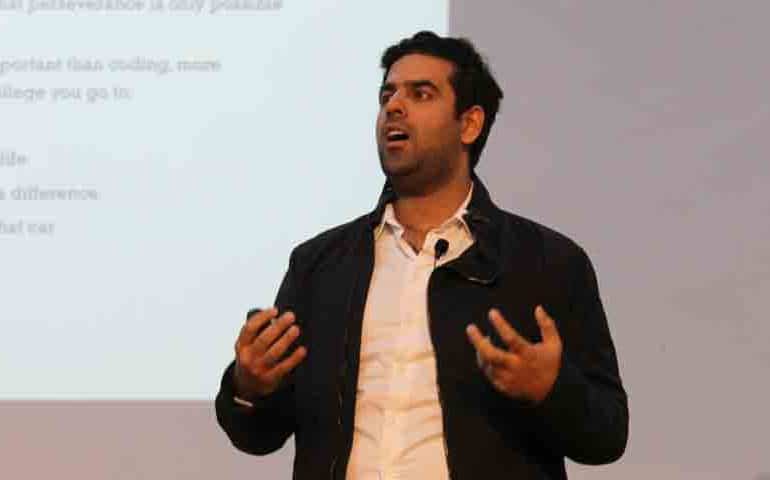
San Francisco-based artificial intelligence expert and entrepreneur Sachin Dev Duggal shared with current QE pupils the “key life lessons” he has learned.
Still only 34, Sachin (OE 1994–2001) has already founded and led three multi-million dollar businesses and has studied at three of the world’s leading universities – Imperial College London, Massachusetts Institute of Technology (MIT) and Stanford in California.
Yet, by his own admission, he was not the brightest in the year when at QE. Moreover, he was never an athlete nor was he in the “cool group”. In a special lecture to Years 8, 9 and 10, he urged boys to be “proud of failure” since “that is where you learn” and he remembered with gratitude certain “anchor teachers” who had played a significant part in forming him.
Sachin recently re-established contact with the Headmaster, Neil Enright, and a visit to his alma mater was speedily arranged. He was accompanied to QE by his wife, Pooja, who is herself an entrepreneur.
Mr Enright said: “I am most grateful to Sachin for giving his time to talk to current Elizabethans: his lecture was at once realistic and very inspiring. It is always tremendously valuable when our illustrious alumni come back and share their often-considerable insights with the boys.”
Sachin’s talk focused on the “four pillars of humanity” – persistence, dreaming, communication and risk.
He recommended “thinking differently about what you want to do”, looking beyond conventional paths. He recalled that his mother had thought him mad to leave the security of a job as an advisor and consultant for Deutsche Bank in order to establish a start-up business. (He had first contacted Deutsche Bank when he was 17, saying: “Give me a go.” They invited him for an interview and, despite their telling him he was too young for the internship he wanted, he ended up working for them for five years.)
Such an approach had taken him from his background in an ordinary, middle-class family, for whom a visit to central London constituted a trip out, to a life that now straddles both the Atlantic and the Pacific – he works in San Francisco, Los Angeles and India.
He currently heads two companies. SD Squared uses AI to build apps or online marketplaces for other businesses – “a platform that does exactly what an in-house engineering team would do without any of the cost of running and managing one”, as the company’s publicity puts it. The second company, Shoto, employs AI to help people get the photos they want from friends – “sharing photos never gets you the photos you want; if you’re lucky someone may share back. With Shoto, your friends can’t see what you send if they don’t also share back”. It then automatically organises photos into albums and trips, all arranged in a timeline.
From 2004 until 2012, Sachin ran Nivio – a start-up he founded which provided a virtual computer (a Windows desktop) streamed over the internet to any device allowing the use of applications on demand – allowing Windows apps to run on iPads, for example.
Based on his own experience, he believes that academic and career development do not have to be sequential but can run in parallel: he was with Deutsche Bank throughout his Information Systems degree at Imperial and since then, Sachin has studied at Stanford, followed MIT’s Entrepreneurial Master’s Program and is now back at Stanford, studying artificial intelligence (AI).
Dreaming, he said, is “the most important thing” and “what gets you up in the morning”. In a nod to his own field of AI, he predicted: “You won’t need to be able to code in future; you’ll just need to be able to dream it.”
Persistence is also essential: he cited not only his perseverance with Deutsche Bank but also subsequently with his own businesses: “When you don’t get the first investor to say ‘yes’…but you go on to raise $20m and build a $100m company.”
Communication is important because it enables you to pre sent yourself well and explain your dreams. Debating skills are valuable, Sachin stated, but he felt saying “umm” was not a fault as it showed some vulnerability: “This is useful in getting people on-side!”
Boys also need to develop an appreciation of risk, he urged. “If you love risk, you’ll do more of it. If you fear risk, you’ll do less of it’. Don’t shy away from the rugby tackle because you anticipate getting hurt. We need a certain proportion of humanity to be willing to take the risks.”
Sachin stated that these four “pillars” complement each other and lend each other their strength. There were, he said, ample opportunities at QE for boys to develop in these areas: in so doing, they could go far.
“What does this all have to do with AI?” he asked in conclusion. “AI can’t do any of these things [but] it can just about do everything else,” he said. It can compute better, make better predictions and store more.
In a Q&A session after the talk, Sachin said boys should look to the silver screen: “What Hollywood dreams, we build 20 years later,” he said, giving as examples space travel, robots and, of course, AI.
